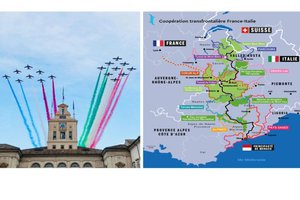News
The Quirinal Treaty – a historical advance for Franco-Italian cross-border cooperation
December 2021
On the eve of France’s presidency of the EU, the French President, Emmanuel Macron, and the head of the Italian government, Mario Draghi, have signed in Rome a bilateral cooperation treaty, the “Quirinal Treaty”. Sixty years after the signature of the Franco-German Élysée Treaty, this “friendship pact” is historical and marks the desire, at the highest level of state, to advance Franco-Italian cross-border cooperation.
The Quirinal Treaty comprises twelve articles. It is accompanied by a roadmap that “sets out the areas for cooperation and projects that the two countries intend to put in place”.
Article 10 of the Treaty is devoted to cross-border cooperation. It emphasises recognition of the Franco-Italian border as a “continuous living area in which the French and Italian populations share a common destiny”, and establishes a “border cooperation committee” dedicated to cross-border issues in the same vein as the Franco-German committee set up by the Aachen Treaty.
More specifically, Article 10 sets out the following concrete objectives:
1. to facilitate “the daily lives of the inhabitants of these territories”;
2. to give players “the appropriate competences to stimulate exchanges and cooperation”, to support “projects that foster the integration of this area and the realisation of its human, economic and environmental potential”, “to strengthen cross-border cooperation in the area of healthcare and assistance from emergency services”,1 to adopt “the regulatory changes and [submit] to their parliaments the legislative changes needed to remove obstacles to border cooperation, including for the creation of joint public services in the areas of social services, healthcare, the environment, energy, education culture and transport”;
3. to extend cooperation in the area of security;
4. to develop a more integrated “rail, road and maritime cross-border transport network”;2
5. to promote “the training of bilingual French- and Italian-speakers”;
6. to study “developments in the border region through the creation of a network of their territorial observation bodies”.
7. The Treaty also provides for the creation of the “border cooperation committee”: “chaired by the Parties’ competent ministers, [it] brings together representatives of local authorities, border territorial authorities and border cooperation bodies, parliamentarians and representatives of central government. [It] meets at least once a year, may propose border cooperation projects in all areas of public policy, and any type of solution to implement them, including where necessary legal, legislative or regulatory ones. [It] may meet […] in the event of a crisis liable to affect both sides of the border.”
The MOT will engage fully with these advances, especially with respect to the issues of governance (cooperation committee) and observation, where its network and expertise constitute a major asset.
1 The roadmap develops the area of “providing emergency assistance on either side of the border” and proposes “to begin negotiations on a cross-border agreement on cooperation between hospitals”, designed to be operational “in case of emergency or crisis”.
2 The roadmap emphasises the improvement of cross-border transport links.

